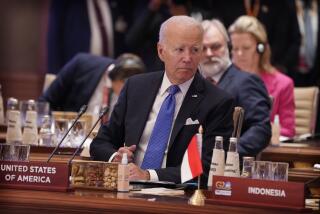Meta says it plans to build the world’s longest undersea internet cable

- Share via
Facebook’s parent company Meta said it’s working on the world’s longest undersea cable as part of the social media giant’s efforts to connect more people to high-speed internet.
Called Project Waterworth, the massive cable spanning more than 50,000 kilometers will bring “industry-leading connectivity” to the United States, India, Brazil, South Africa and other regions, Meta said.
“This project will enable greater economic cooperation, facilitate digital inclusion, and open opportunities for technological development in these regions,” Meta said in a blog post on Feb. 14.
Meta expects the multibillion-dollar project will be completed toward the end of the decade, but didn’t provide a specific year or estimates of how much it will cost.
Tech leaders including Meta, Google, Amazon and Microsoft have been investing heavily in undersea cables for years as a way to provide more affordable and reliable internet across the globe. As more people connect to the internet to chat and stream videos, these investments also allow tech companies to attract more users to their services.
An estimated 95% of global internet traffic travels through subsea cables, making them the backbone of the internet, according to a 2024 report from the Global Digital Inclusion Partnership.
Like other major tech firms, the social network has been ramping up efforts to build more artificial intelligence-powered tools that can generate text, images and other content. Meta said in its blog post that its 24 fiber pair cable project “can help ensure that the benefits of AI and other emerging technologies are available to everyone, regardless of where they live or work.”
The company said it has developed more than 20 subsea cables with partners over the last decade. Some of Meta’s undersea cables have included 2Africa Pearls, connecting Africa, Europe and Asia, and Marea, connecting the United States with Spain.
More than 3 billion people use one of Meta’s apps daily, which include Facebook, Instagram, WhatsApp and Messenger.
The expansion of undersea cables to provide internet and telecommunications has also heightened concerns that the infrastructure will be targeted during geopolitical conflicts.
Last year, underwater cables in the Red Sea, lying between Africa and Asia, were cut and disrupted internet service. It was unclear how the cables were damaged and Yemen’s Houthi rebels denied attacking the lines to pressure Israel to end its war on Hamas in Gaza, the Associated Press reported.
Meta’s latest investments also come as its Chief Executive Mark Zuckerberg tries to mend a strained relationship with President Trump, who he’s previously sparred with over immigration issues and content moderation. This year, Meta ended its third-party fact-checking program, relying instead on users to write notes under misleading posts, and rolled back DEI efforts that Trump has criticized.
Zuckerberg also praised Trump in Meta’s quarterly earnings call in January, noting that his administration “prioritizes American technology winning” and has visited the president at the White House.
Last week, the White House mentioned Meta’s undersea cable project in a joint statement from President Trump and India’s Prime Minister Shri Narendra Modi about how the two countries are working together.
Meta’s project, the statement said, would “strengthen global digital highways” in the Indian Ocean and India plans to invest in the maintenance, repair and financing of these undersea cables.
More to Read
Inside the business of entertainment
The Wide Shot brings you news, analysis and insights on everything from streaming wars to production — and what it all means for the future.
You may occasionally receive promotional content from the Los Angeles Times.











